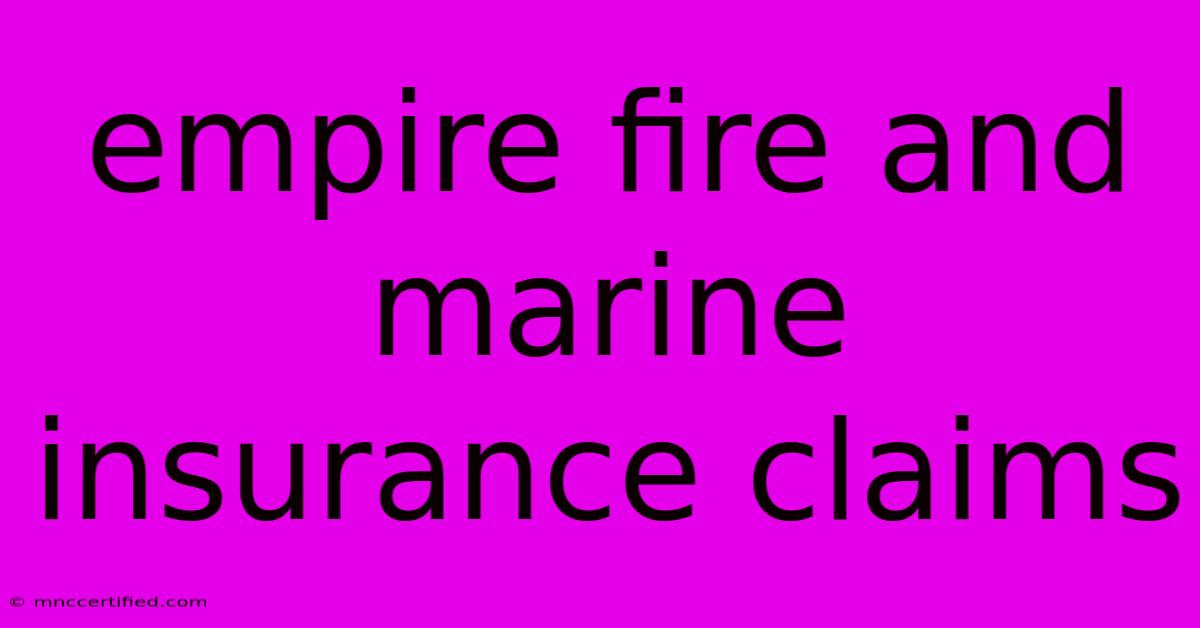Empire Fire And Marine Insurance Claims

Table of Contents
Navigating Empire Fire & Marine Insurance Claims: A Comprehensive Guide
Empire Fire & Marine Insurance is a reputable insurance provider known for its comprehensive coverage options. However, when it comes to filing a claim, the process can feel overwhelming. This guide will equip you with the knowledge you need to navigate Empire Fire & Marine insurance claims smoothly and efficiently.
1. Understanding Your Policy
Before contacting Empire Fire & Marine, it's crucial to thoroughly understand your policy's coverage details. This includes:
- Coverage limits: Know the maximum amount your policy will cover for specific incidents.
- Deductibles: Be aware of the amount you're responsible for paying before the insurance kicks in.
- Exclusions: Familiarize yourself with any situations or events not covered by your policy.
Tip: Keep your policy documents readily available, especially your policy number, for easy access during the claims process.
2. Reporting Your Claim
The first step after an incident is to report your claim promptly.
Here's how you can do it:
- Call the claims hotline: Empire Fire & Marine has a dedicated claims hotline available 24/7.
- File a claim online: Check their website for an online claims portal. This is usually the fastest and most convenient option.
Important information to have prepared when reporting your claim:
- Your policy number: Essential for identifying your policy.
- Details of the incident: Include the date, time, location, and a brief description of what happened.
- Your contact information: Ensure you provide accurate phone numbers and email addresses for easy communication.
3. Gathering Supporting Documentation
To support your claim, you'll need to gather relevant documentation. This includes:
- Police report (if applicable): Necessary for accidents involving vehicles or property damage.
- Photos and videos: Capture the damage from all angles to provide visual evidence.
- Receipts and invoices: For any expenses incurred due to the incident.
- Medical records: If the incident involved injuries.
4. Working with the Claims Adjuster
Once your claim is filed, you will be assigned a claims adjuster. Their role is to investigate the incident, assess the damages, and determine the amount of compensation you're eligible for.
- Be honest and transparent: Provide accurate information and be upfront about the circumstances of the incident.
- Cooperate fully: Respond promptly to any requests from the adjuster and provide all necessary documentation.
- Ask questions: Don't hesitate to clarify any information you're unsure of.
5. Understanding the Settlement Process
The claims adjuster will evaluate your claim and propose a settlement amount.
- Negotiate: If you disagree with the proposed settlement, you can negotiate with the adjuster.
- Seek legal advice: If you feel the settlement offer is unfair or inadequate, consider seeking legal advice from an insurance attorney.
- Review the final settlement: Thoroughly review the final settlement documents before signing, ensuring all details are accurate.
6. Tips for Successful Claims
- Act quickly: Report your claim promptly to avoid potential delays or complications.
- Keep good records: Maintain thorough records of all communications, documentation, and expenses related to your claim.
- Be patient: The claims process can take time. Stay calm and persistent throughout the process.
7. Empire Fire & Marine Resources
- Website: Visit their official website for detailed information on claims procedures and FAQs.
- Contact Information: Locate their phone numbers and email addresses on their website for direct communication.
Remember: Navigating insurance claims can be challenging. By understanding the process, gathering necessary documentation, and communicating effectively, you can ensure a smooth and successful resolution.

Thank you for visiting our website wich cover about Empire Fire And Marine Insurance Claims. We hope the information provided has been useful to you. Feel free to contact us if you have any questions or need further assistance. See you next time and dont miss to bookmark.
Featured Posts
-
Will Health Insurance Cover Wisdom Teeth
Nov 08, 2024
-
Allied Professionals Insurance Services
Nov 08, 2024
-
Timberwolves Honor Prairie Island Community
Nov 08, 2024
-
Rhea Insurance In New Albany Mississippi
Nov 08, 2024
-
Bo E Interest Rate Cut Mortgage Outlook
Nov 08, 2024